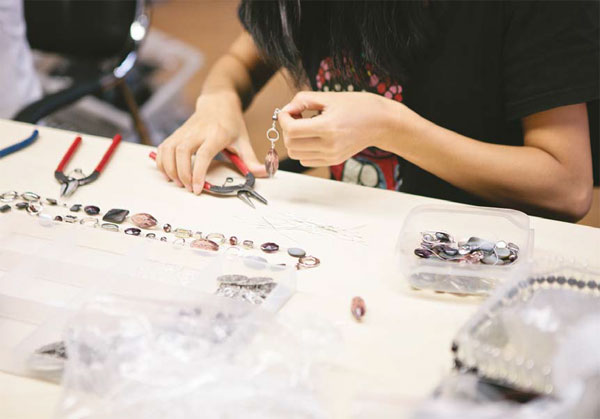Each woman's life valuable as a gem

Beijing jewelry manufacturer provides training and accommodation for vulnerable women
An entrepreneur is helping vulnerable and abused women to get their lives back on track by offering them work at her jewelry company in Beijing.
Jenny McGee launched Starfish in 2007 and has so far helped 100 women, many of whom were tricked into working in the sex trade after moving to the Chinese capital from the countryside.

| Starfish helps vulnerable and abused women find productive and happy lives. Photos provided to China Daily |
The 38-year-old provides them with jobs making jewelry to be sold in China, the United States, Australia and New Zealand, as well as accommodation, training and counseling.
"We train them so that they can get opportunities to work in other companies and start new lives, which we're really happy to see," she says. "They feel proud that people are buying the products they make not out of pity, but because it's really good jewelry."
Starfish's Beijing workshop currently employs 15 women, while another 15 are based at the company's office in central Henan province. The youngest is 20, the eldest is 45, and each earns from 2,500 to more than 4,000 yuan ($390 to $630) a month.
McGee, who is from Indiana in the US, first arrived in China in 2001 on a student exchange program. She returned the next year, this time with her husband, to study Mandarin at Beijing Foreign Studies University.
Around the time she launched her business, she started to learn more about women from poor rural areas in central and western China who end their schooling and migrate to large cities to find work to support their families.
Parents in the Chinese countryside, who have largely been exempt from the country's 30-year one-child policy, tend to prefer boys and some will continue having children until they have a son. This can lead to large households.
McGee says many of the women she has worked with were sent to Beijing by their families to earn a decent salary but instead had been tricked into working at illicit "hair salons" and "massage parlors" that offered sexual services.
"These girls felt it their obligation to feed their family," she says. "They gave up their chance to study so that their brothers could get a better education ... or get married."
Determined to help out, the American began visiting vulnerable women and offering them an alternative. "We took them flowers. I found most just wanted to feel like somebody cared," she says, adding that it generally takes time to win the women's trust because most are sensitive about their backgrounds and do not want to get tricked again.
Amy, one of the women working at Starfish, says her father walked out on her family when she was young and that her stepfather had abused her. She left home at 15 and turned to prostitution to earn a living.
"When I thought I'd reached my end, I met Jenny McGee," she recalls. "Now I work hard at Starfish and I'm happy. I'm able to laugh and cry again - not tears of sadness but joy. I celebrated my 21st birthday here. It was the first time someone made me a birthday cake and sang to me. For the first time I feel that people care about me and love me unconditionally."
Several Chinese managers and American designers also work at the workshops in Beijing and Henan to teach the women manufacturing, design, accounting, photography and production management. The company also offers courses in English, as well as grants to further their education and healthcare insurance.
Over the years, many workers have regained their self-confidence and left Starfish - some after several years, some after just a few months - to start new jobs and new lives with husbands who accept and understand their past.
"If any of them have any difficulties in their families or work, they can come back to our dormitory immediately," says Wu Xiaoling, a manager at the Beijing workshop for six years. "This is where they feel safe and cared for."
She says the company regularly organizes fun activities for the women to help heal the wounds from their past.
"Recently they performed a fashion show (in Beijing)," she says. "They all got dressed up and did each other's makeup. They were all so beautiful. It was really touching. These girls give me so much happiness."
When asked about her understanding of the company philosophy, Wu repeats the old maxim: Give a man a fish and you feed him for a day; teach a man to fish and you feed him for a lifetime.
"We're not a charity," she says. "We help these women by teaching them to fish, not by exposing their pain and giving them a fish."
McGee explains that the name of her jewelry company was also inspired by an old tale: "An elderly man came upon a young boy who was throwing starfish that had been washed ashore back in to the ocean. He asked the boy, 'There are thousands of starfish and only one of you, what difference can you make?' The boy picked up a starfish, tossed it into the water and said, 'I made a difference to that one'.
"We'll go on helping getting the starfish back to the water, and I hope one day I'll see Chinese parents all celebrate the birth of their daughters and ... see girls share the same opportunities as boys do," she adds.
Yan Dongjie contributed to this story.
Contact the writer at yandongjie@chinadaily.com.cn
(China Daily Africa Weekly 10/30/2015 page28)
Today's Top News
- Bombs over talks expose Washington's diplomatic charade
- European leaders react to strikes on Iran
- Nations urge caution after US strikes on Iran
- Saudi, UAE leaders condemn 'dangerous' Iran escalation
- China expresses grave concern over US-Israel attacks on Iran
- US-Israel attacks on Iran open Pandora's box






























